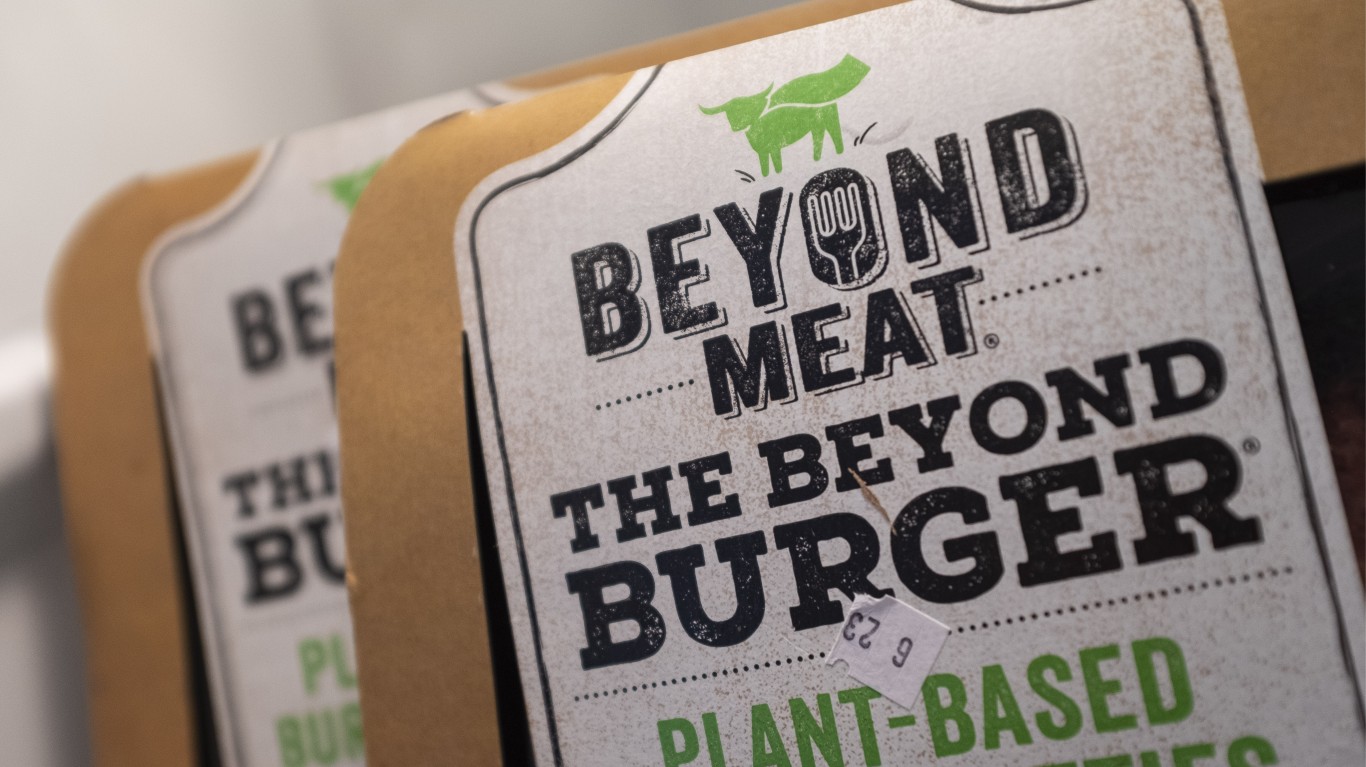
Which retailer wouldn’t want to have a hit with Chinese consumers? The world’s largest consumer market presents almost unimaginable growth potential for any maker of consumer goods.
Beyond Meat Inc. (NASDAQ: BYND) is the latest company to make inroads in China. The El Segundo, California-based company is expanding in China through two new important distribution deals.
The stock shot up 21.7% Monday, to close at $162.46. The S&P 500 closed up 1.2% in another stellar day for Wall Street. Beyond Meat’s stock price is now way above the average target set by analysts: $93.94. Still, JPMorgan Chase last week upgraded its rating to Hold.
Bringing Beyond to China
On Monday, Beyond Meat said it is partnering with Sinodis, a Chinese food distributor of imported products. The company will sell Beyond Beef and the Beyond Burger to 4,500 restaurants, hotels and wholesalers in China.
Sinodis is a subsidiary of the French company Savencia Fromage & Dairy. In China, Sinodis sells about 50 food brands from 14 different countries.
And last week, Beyond Meat began a trial run with Yum China Holdings (NYSE: YUMC) fast-food restaurants, including KFC, Pizza Hut and Taco Bell. Yum will sell Beyond Burgers for a limited period. This marks the first time the faux burgers have been sold in China.
Yum has been interested in meat alternatives for a while. It recently ran a trial of plant-based chicken nuggets at some KFC locations. “We see great potential for the plant-based meat market in China,” said CEO Joey Wat. “This latest introduction across KFC, Pizza Hut and Taco Bell brands is expected to capture valuable consumer feedback across different regions in China.”
The Sinodis and Yum deals aren’t Beyond Meat’s first moves in China. Earlier this year, the company partnered with Starbucks Corp. (NASDAQ: SBUX) to bring Beyond Beef to 3,300 Chinese outlets. Starbucks designed a new lunch menu for Chinese customers featuring lasagna and other kinds of pasta using Beyond Meat’s plant-based beef products.
In announcing the Starbucks deal, Beyond Meat said it would establish a Chinese-language website and market its plant protein products through popular social media channels Weibo and WeChat.
“Our goal is to increase availability of plant-based meat globally, providing consumers with more choice and access to the nutritional and environmental benefits of plant-based meat,” said Chuck Muth, Beyond Meat’s chief growth officer. “China is an important market given its large population and interest in plant-based proteins.”
The Growth Potential
As an import, Beyond Meat’s plant-based foods will likely be seen as premium goods. China’s wealthiest consumers are a small but influential group. A Goldman Sachs report found that there are 1.4 million in China’s top wealth tier. This includes those making over $500,000 per year.
But the really appealing group for retailers is China’s growing middle class — currently about 11% of the Chinese population, according to Goldman Sachs. There are 146 million people in this group, with an annual income per capita of $11,700. There’s a third tier of working class Chinese hoping to move into the middle class. This group includes 236 million people.
A McKinsey & Co. report from December sums up the business opportunities: “The overall pace at which Chinese consumption has grown is almost hard to imagine: just a decade ago, most urban Chinese had enough money to cover basic needs like food, clothes, and housing. 92 percent had annual household disposable incomes of 140,000 renminbi ($19,800) or less. Today, half are living in relatively well-to-do households … where they have ample funds for perks like regular meals out, beauty products, flat-screen TVs, and holiday travel.”
Urban consumer spending now accounts for more than 60% of GDP growth, the report said. Between 2010 and 2017, Chinese consumer spending represented 31% of worldwide household consumption growth.
Impossible Plans
Beyond Meat isn’t the only meat-alternative manufacturer to target China. In March, privately held Impossible Foods secured half a billion dollars in funding. The round included big investors in South Korea, Hong Kong and Singapore.
“Last November, Impossible Foods CEO Patrick Brown traveled to Shanghai to drum up excitement for the company’s debut in China, handing out free Impossible Burger samples at a major trade show,” CNN reported. The company hasn’t yet announced plans for a mainland China launch. But it is already selling Impossible products in Hong Kong and Singapore.
In the U.S., the battle between the Beyond Burger and the Impossible Burger continues. Impossible recently launched a new home delivery service for American consumers. Customers can have the plant-based burgers shipped to their homes in 48 states.
Beyond Meat and Impossible Foods have been taking advantage of expanding interest in vegan protein products as the COVID-19 pandemic reduced supplies of beef, pork and chicken in grocery stores across the country. Beef and pork producers, including Tyson Foods Inc. (NYSE: TSN), shut down plants earlier this year to reduce the spread of coronavirus after large numbers of employees tested positive.
Thank you for reading! Have some feedback for us?
Contact the 24/7 Wall St. editorial team.
 24/7 Wall St.
24/7 Wall St.
